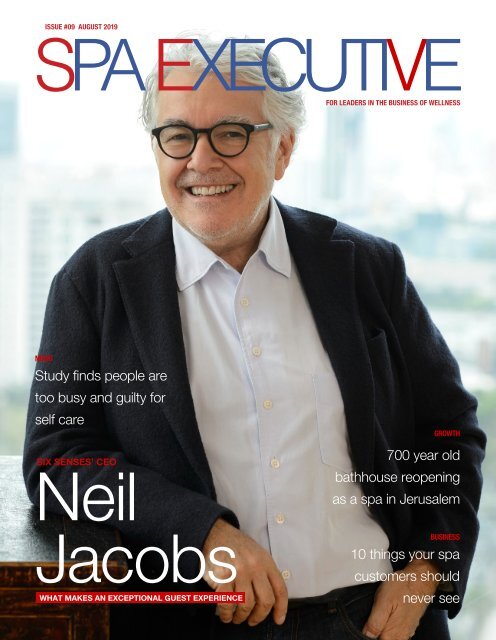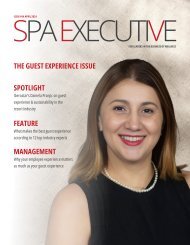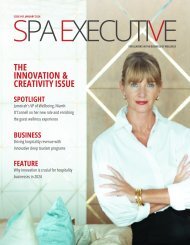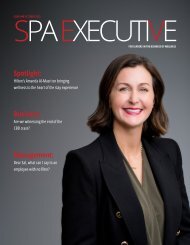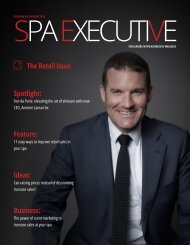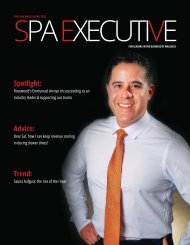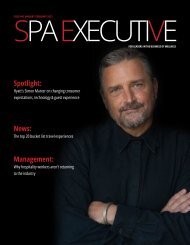Spa Executive | Issue 9 | August 2019
Empathy is important to business success. Research bears this out. One recent study found that 91% of CEOs believe empathy is directly linked to a company's financial performance, and that more than 90% of employees say they're more likely to stay with an empathetic employer. In this issue, we’re talking about empathy. In our Spotlight interview we asked Six Senses’ CEO Neil Jacobs what makes an exceptional guest experience. And he said, “Our role is to make a difference in people’s lives where they feel rested and rejuvenated and leave with an expanded view. In an industry with players claiming service focus, Six Senses stands out as the brand with empathy.” An enviable position to be in, I’d say.
Empathy is important to business success. Research bears this out. One recent study found that 91% of CEOs believe empathy is directly linked to a company's financial performance, and that more than 90% of employees say they're more likely to stay with an empathetic employer.
In this issue, we’re talking about empathy. In our Spotlight interview we asked Six Senses’ CEO Neil Jacobs what makes an exceptional guest experience. And he said, “Our role is to make a difference in people’s lives where they feel rested and rejuvenated and leave with an expanded view. In an industry with players claiming service focus, Six Senses stands out as the brand with empathy.”
An enviable position to be in, I’d say.
Create successful ePaper yourself
Turn your PDF publications into a flip-book with our unique Google optimized e-Paper software.
ISSUE #09 AUGUST <strong>2019</strong><br />
SPA EXECUTIVE<br />
FOR LEADERS IN THE BUSINESS OF WELLNESS<br />
NEWS<br />
Study finds people are<br />
too busy and guilty for<br />
self care<br />
SIX SENSES’ CEO<br />
Neil<br />
Jacobs<br />
WHAT MAKES AN EXCEPTIONAL GUEST EXPERIENCE<br />
GROWTH<br />
700 year old<br />
bathhouse reopening<br />
as a spa in Jerusalem<br />
BUSINESS<br />
10 things your spa<br />
customers should<br />
never see
PUBLISHER<br />
Roger Sholanki<br />
EDITOR<br />
Elizabeth Bromstein<br />
CREATIVE DIRECTOR<br />
Basheer Mohamed<br />
DESIGNER<br />
Shajee Aijazi<br />
Note from the Publisher<br />
Empathy is important to business success. Research bears this out. One recent study found<br />
that 91% of CEOs believe empathy is directly linked to a company's financial performance, and<br />
that more than 90% of employees say they're more likely to stay with an empathetic employer.<br />
In this issue, we’re talking about empathy. In our Spotlight interview we asked Six Senses’ CEO<br />
Neil Jacobs what makes an exceptional guest experience. And he said, “Our role is to make a<br />
difference in people’s lives where they feel rested and rejuvenated and leave with an expanded<br />
view. In an industry with players claiming service focus, Six Senses stands out as the brand with<br />
empathy.”<br />
An enviable position to be in, I’d say.<br />
This need is imperative in spa, where therapists and service providers give a great deal of<br />
themselves in supporting the wellbeing of guests. For our team members to be successful in<br />
this, this emotional intelligence needs to trickle down from the top and flow outwards.<br />
It takes empathetic leadership to attract and retain top talent, and empathetic business<br />
sensibilities to listen to and communicate with our guests. The first point is evident when we talk<br />
about “Five spa management blunders that cost you employees,” and the second in a study<br />
finding that “People are too busy and guilty for self care.” If you’re in the business of helping<br />
others, a valuable message you can send out into the world is that it’s OK to care for yourself.<br />
Empathy is imperative to getting the best out of our employees and giving the best to our<br />
guests. It may be the most important soft skill you can develop for your business.<br />
Shouldn’t we all aim to be “the brand with empathy?”<br />
Roger Sholanki, CEO<br />
Book4Time<br />
The online magazine for <strong>Spa</strong><br />
<strong>Executive</strong>s, featuring news<br />
and exclusive interviews.
Contents<br />
<strong>August</strong> <strong>2019</strong> Volume 9<br />
3<br />
NEWS<br />
Study finds people are too busy<br />
and guilty for self care (let’s<br />
change that)<br />
3<br />
5<br />
7<br />
MANAGEMENT<br />
Five spa management blunders<br />
that cost you employees<br />
SPOTLIGHT<br />
Six Senses CEO Neil Jacobs -<br />
What makes an exceptional<br />
guest experience<br />
11<br />
BUSINESS<br />
10 things your spa customers<br />
should never see<br />
13<br />
GROWTH<br />
Hammam al-Ayn: 700 year old<br />
bathhouse reopening as a spa<br />
in Jerusalem<br />
7<br />
15<br />
TECHNOLOGY<br />
Shiseido’s Optune is an Internet<br />
of Things skincare system<br />
16<br />
FEATURE<br />
Three reasons why empathy is<br />
crucial to spa business success<br />
18<br />
GROWTH<br />
The Red Door <strong>Spa</strong> and Salon is<br />
rebranding for a new era<br />
13 20<br />
20<br />
TRENDS<br />
HIIT may be the secret to<br />
fighting brain aging
Study finds people are too<br />
busy and guilty for self care<br />
If you’re in the business of helping others take<br />
care of themselves, a valuable message you<br />
can send out into the world is that it’s OK to<br />
take some time for self care. Busy people<br />
need to know this is OK. Moms and dads<br />
need to know it’s OK. Potential spa<br />
customers who are too busy, or who feel<br />
guilty about taking a moment of “me time”<br />
need to know that it’s OK.<br />
People need to be reminded that caring for<br />
oneself actually makes you better equipped<br />
to deal with all of the challenges life has to<br />
offer, and to care for those around you. It<br />
makes you a better YOU.<br />
This is <strong>Spa</strong> <strong>Executive</strong>’s takeaway after<br />
reading a recent study showing that people’s<br />
relationships with self care are complicated<br />
and fraught.<br />
Duty to others gets in the way<br />
Self care – like a trip to the spa – is<br />
something we should all be making time for.<br />
But the study found that many struggle with<br />
feelings of guilt over taking some time for<br />
themselves and that duty to others often gets<br />
in the way, particularly for women.<br />
For the study, Birchbox and Kelton Global<br />
surveyed over 1,000 people in the U.S.A. to<br />
03 | <strong>Spa</strong> <strong>Executive</strong> News
gauge attitudes and behaviors towards<br />
self-care.<br />
We know we need it but we don’t have<br />
the time<br />
Eighty-nine percent of people agree that<br />
“even just a few minutes of ‘me time’ can<br />
make a world of difference,” but 40% of<br />
people say they rarely have time for it.<br />
Moreover, only 35% of people say they<br />
consistently and routinely make time for<br />
self-care, vs. 62% who approach self-care in<br />
a more sporadic manner.<br />
Respondents said they feel overwhelmed and<br />
burnt out. Sixty percent of people often feel<br />
“overwhelmed by everything that needs to be<br />
done,” while 51% say that they often feel<br />
burnt out.<br />
Men are better at taking time for<br />
themselves than women<br />
Moms are more likely to feel both<br />
overwhelmed (66% vs. 53%) and burnt out<br />
(54% vs. 43%) than dads. But, despite this,<br />
more men than women actually make time for<br />
self care, (39% vs. 32%) and men are more<br />
likely to block “me time” off on their calendars<br />
(34% vs. 26%).<br />
Parents as a whole are more likely to feel they<br />
don’t have time for self-care than people who<br />
don’t have kids (45% vs. 32%). And parents<br />
are also quite likely to feel guilty about taking<br />
time for themselves (39% vs. 26%).<br />
Sixty-seven percent of people said that they<br />
consistently put others ahead of themselves.<br />
Thirty-three percent feel guilty about taking<br />
time for themselves, and women feel guiltier<br />
than men (37% vs. 30%).<br />
People need to<br />
be reminded<br />
that caring for<br />
oneself actually<br />
makes you<br />
better equipped<br />
to deal with all<br />
of the<br />
challenges life<br />
has to offer,<br />
and to care for<br />
those around<br />
you.<br />
More findings include:<br />
• Gen Zers are most likely to feel burnt out<br />
(73%), followed by Millennials (57%) and Gen<br />
Xers (54%), while Boomers and up are less<br />
likely to feel burnt out (39%).<br />
• Just over one in five (21%) have let guilt get<br />
in the way of taking time for themselves.<br />
• Single people are more likely to regularly<br />
make time for self-care than people who are<br />
married or in a relationship (42% vs. 30%).<br />
• Nearly half (45%) of city dwellers say that<br />
they rarely have time to care for themselves.<br />
Fewer people in small towns and rural areas<br />
say the same (39%).<br />
What we define as self care<br />
When it comes to what we call “self care,”<br />
looking after our bodies is our main focus,<br />
along with beauty and grooming rituals.<br />
• 74% of people say self-care means taking<br />
care of their bodies.<br />
• 74% associate fitness and exercise<br />
activities with self-care.<br />
• 72% associate beauty or grooming rituals<br />
with self care.<br />
These grooming rituals include:<br />
• Taking a bubble bath or hot shower (50%)<br />
• Carrying out their beauty or grooming<br />
routine (37%)<br />
• Having a spa day (30%)<br />
• Getting a manicure or pedicure (30%)<br />
• Putting on a face mask (21%)<br />
Communicating the benefits of myriad forms<br />
of self care is key. Be it the incredible health<br />
benefits of a walk in nature, a sauna, or a<br />
massage. Or the amazing stress relieving<br />
effects of meditation. It doesn’t always have<br />
to be an entire spa day.<br />
Communicate to your guests and potential<br />
guests that everyone should take some time<br />
for themselves.<br />
They deserve it.<br />
Trends<br />
<strong>Spa</strong> <strong>Executive</strong> | 04
Five spa management blunders<br />
that cost you employees<br />
Are you making these spa management<br />
blunders that cost you employees?<br />
<strong>Spa</strong> management isn’t easy and neither is<br />
attracting and retaining top talent. And you<br />
definitely need to be good at the latter in<br />
order to do the former.<br />
<strong>Spa</strong> is pretty much in a staffing crisis,<br />
according to many. Even when we can find<br />
people to join our teams, we can’t keep them<br />
around, as they often leave to start their own<br />
businesses or work independently.<br />
The good news is that much of this employee<br />
turnover can probably be reduced by making<br />
some changes to some unfortunate spa<br />
management practices.<br />
We looked back at some interviews we’ve<br />
done with spa industry experts on staffing<br />
and employee retention, and found a lot of<br />
valuable insights on what we should and<br />
should not be doing if we want top talent to<br />
stick around.<br />
Here are five common spa management<br />
blunders that cost you employees<br />
Burning employees out<br />
<strong>Spa</strong> team members are often overworked<br />
and exhausted , because managers aren’t<br />
thinking about the bigger picture. Leaders<br />
feel pressured to fit in as much as possible to<br />
maximize revenue, and pushing service<br />
providers to do more work days and cram in<br />
more treatments can seem like an effective<br />
business strategy. But this tactic is short<br />
sighted, and will cost you a lot more than it<br />
saves – particularly in high staff turnover.<br />
Sonal Uberoi of <strong>Spa</strong> Balance Consulting told<br />
05 | <strong>Spa</strong> <strong>Executive</strong> Management
us in a recent interview that spas should<br />
make staff wellbeing a priority “instead of<br />
therapist productivity and financial targets.”<br />
She added, “Needless-to-say, the latter are<br />
important, but without the former, the latter is<br />
not possible.”<br />
Hiring for skill and experience over<br />
attitude<br />
We recently asked Todd Hewitt, Assistant<br />
Vice President of <strong>Spa</strong> at Shangri-La Hotels<br />
and Resorts, what characteristics he looks<br />
for in talent. He said, “A smile, sense of<br />
humor, and eagerness. I don’t care about<br />
experience. That can be quickly learned.”<br />
It’s one of the oldest pieces of hiring wisdom<br />
out there, and yet so many people ignore it.<br />
Do so at your own peril. If you hire someone<br />
who is lacking skill and experience but has a<br />
great attitude, they will be eager to learn and<br />
will soon have the experience and a great<br />
attitude. If you hire someone who has all the<br />
skills and experience, but a bad attitude, they<br />
will always have a bad attitude. Because<br />
those things rarely change, and that will<br />
always be a problem.<br />
Not giving team members autonomy and<br />
responsibility<br />
Nobody likes to be micromanaged. And yet,<br />
so many managers micromanage and don’t<br />
invite team members into the decision<br />
process or trust then to govern themselves.<br />
Few things are more disheartening to an<br />
adult than not being treated like one.<br />
Todd Hewitt said in his interview, “I love<br />
looking into the eyes of individuals who want<br />
to learn more or take on more tasks. As<br />
difficult as it is to let go of control, give them<br />
extra jobs or duties and see how they do.<br />
Provide goals and deadlines. And when<br />
completed, be honest with them and tell<br />
them what you like and what could be<br />
improved.”<br />
Treating staff<br />
with the utmost<br />
respect is very<br />
important to me.<br />
The way I see it,<br />
they’re my<br />
internal guests,<br />
and if I take care<br />
of them, they will<br />
take care of the<br />
other guests.<br />
Daisy Tepper<br />
<strong>Spa</strong> Manager at the Post Oak Hotel<br />
Not communicating expectations and<br />
establishing boundaries<br />
Team members need to be told what the<br />
goals and targets of an organization are. They<br />
need to know what sort of a guest experience<br />
you aim to provide (a fantastic one,<br />
obviously…but with details and touches<br />
specific to your spa), and how you will<br />
provide it. If this is not communicated, they<br />
will ultimately fail to live up to expectations,<br />
because nobody can live up to expectations<br />
when they don’t know what those expectations<br />
are. This results in frustration and<br />
disappointment for everyone, and creates a<br />
bad employee experience.<br />
Boundaries are also key. In an article on<br />
creating a drama free workplace, Eric<br />
Stephenson of Elements Massage recently<br />
told us, “I noticed that when the leadership<br />
was good at establishing boundaries and<br />
communicating expectations, there were<br />
fewer negative emotions draining the culture.”<br />
We are all better when we know what is<br />
expected of us and where the boundaries<br />
are.<br />
Not treating staff like important people<br />
When we spoke with Daisy Tepper, <strong>Spa</strong><br />
Manager at the Post Oak Hotel at Uptown<br />
Houston, about how she and her team<br />
managed to earn a Five Star rating from<br />
Forbes Travel Guide just three months after<br />
opening, she talked about treating her staff<br />
like guests.<br />
Tepper said, “Treating them with the utmost<br />
respect is very important to me. The way I<br />
see it, they’re my internal guests, and if I take<br />
care of them, they will take care of the other<br />
guests. The bread and butter comes from<br />
these people. When you treat people well,<br />
they will go above and beyond.”<br />
And when you don’t treat people well, they<br />
will leave.<br />
At the end of the day, if you treat your team<br />
members they way you would like to be<br />
treated, you’ll keep them around longer.<br />
Management<br />
<strong>Spa</strong> <strong>Executive</strong> | 06
Neil Jacobs<br />
Six Senses<br />
What makes an exceptional guest experience &<br />
what’s exciting in spa and wellness right now<br />
Neil Jacobs is the CEO of Six Senses Hotels<br />
Resorts <strong>Spa</strong>s, one of the world’s most<br />
renowned luxury hotel and resort brands and<br />
a leading name in the wellness space.<br />
Mr. Jacobs has more than thirty years of<br />
experience in the hotel and spa industry, and<br />
his passions include wellness, sustainability,<br />
innovative design, food, and experiential<br />
travel. He studied Hotel Management at<br />
Westminster Hotel School in London, French<br />
Civilization at La Sorbonne University, and<br />
Italian culture and art in Florence, and is<br />
fluent in five languages.<br />
With Mr. Jacobs at the helm, it’s no surprise<br />
that so many things make Six Senses a<br />
standout in spa and wellness, from the<br />
commitment to sustainability and community,<br />
to beautiful properties in breathtaking<br />
settings, to creative guest experience<br />
offerings you won’t find elsewhere.<br />
Six Senses recently joined the<br />
InterContinental family of brands, a move that<br />
Mr. Jacobs called, “an exciting new era.” He<br />
added, “IHG believes in our purpose to<br />
merge the two platforms of wellness and<br />
sustainability to promote personal health, and<br />
the health of the planet.”<br />
We spoke with him about what makes Six<br />
Senses so special, what makes an<br />
exceptional guest experience, and what he is<br />
most excited about in spa and wellness right<br />
now.<br />
What do you think makes Six Senses<br />
such a standout among spas and<br />
wellness businesses?<br />
Six Senses <strong>Spa</strong>s has an advisory board of<br />
amazing experts in their respective fields,<br />
which includes doctors and scientists, to help<br />
and direct us as to what is happening within<br />
their respective fields and to navigate on what<br />
is right or not for our guests. We have a<br />
wellness operational department plus a<br />
wellness innovation team where we look at all<br />
things wellness and also what is trending. We<br />
are constantly on the outlook for innovations,<br />
therapies and technologies. I don’t think that<br />
any other hospitality and wellness brand<br />
does what we do and it shows how we aim<br />
to stand out from the crowd.<br />
What makes an exceptional guest<br />
experience?<br />
Luxury is all about subtlety and experience –<br />
offering our guests a chance to interact with<br />
the community around them in a way that<br />
feels genuine and authentic. Our role is to<br />
make a difference in people’s lives where<br />
they feel rested and rejuvenated and leave<br />
with an expanded view. In an industry with<br />
players claiming service focus, Six Senses<br />
stands out as the brand with empathy. The<br />
07 | <strong>Spa</strong> <strong>Executive</strong> Spotlight
exceptional service experienced by guests is<br />
a result of every one of our hosts believing in<br />
the brand and understanding the<br />
commitment of the group to guests,<br />
environment and the individual communities<br />
of which we are a part.<br />
What is luxury today and how is it<br />
different from luxury ten years ago?<br />
My personal observation is that the delivery<br />
of luxury is becoming more relaxed and<br />
losing its formality with greater focus on<br />
guest convenience and being responsive to<br />
guest comforts. Technology simplifies and<br />
makes everything easier. We just need to be<br />
careful not to overdo it and be sure that all<br />
aspects are purposeful, and not use tech for<br />
tech’s sake.<br />
Can you talk a bit about the importance<br />
of community, and how you and Six<br />
Senses are trying to encourage this?<br />
At Six Senses we think that community is an<br />
important aspect that is missing in much of<br />
today’s world. How we interact with<br />
community is important when it comes to<br />
building a business with sustainability in<br />
mind. Our commitment is towards developing<br />
our people and we hire local where possible.<br />
Our hosts are personally involved in<br />
community projects and we invite guests to<br />
participate if they wish.<br />
Another major issue for Six Senses is<br />
sustainability. Can you tell us a bit about<br />
your efforts in this area?<br />
Sustainability initiatives include being<br />
plastic-free by 2022; each property has an<br />
Earth Lab where guests can learn about our<br />
sustainability programs; our on-property<br />
production of Six Senses Water for guests<br />
and hosts – in still and sparkling – using<br />
Spotlight<br />
<strong>Spa</strong> <strong>Executive</strong> | 08
eusable glass bottles which eliminates the<br />
carbon footprint of shipping water and<br />
1,690,376 plastic bottles in 2018.<br />
What would you say is the biggest<br />
challenge currently facing spa and<br />
wellness?<br />
There are many wonderful opportunities<br />
constantly being presented to Six Senses.<br />
We must always be sure of our ability to<br />
execute well and deliver what we promise our<br />
guests. It’s easy to be lured into growth, but<br />
growth for growth’s sake is not the road we<br />
travel. Each Six Senses project must be<br />
accretive and further our goals and embody<br />
our values.<br />
What are you most excited about in<br />
wellness right now?<br />
At Six Senses, we have been working the<br />
past six years with servicing our guests with<br />
scientific personalized wellness through<br />
biomarker testing, TCM assessment,<br />
Ayurvedic assessments, sleep assessments,<br />
movement assessments, and more. We see<br />
that mental wellness and brain health in<br />
general are in focus, and we are working with<br />
neuroscientists and doctors on programs<br />
such as our Holistic Anti-Aging Center.<br />
Biohacking is a big trend right now, and in<br />
particular using technology or processes that<br />
speed up your wellness. It may be something<br />
like wearing blue blocking glasses an hour<br />
before sleep in order to sleep better (and we<br />
do provide this at Six Senses as well), ice<br />
baths, or more technologically advanced<br />
hacking such as neurofeedback,<br />
vibroacoustic loungers and more.<br />
Another trend is Energy medicine, looking at<br />
all that which we cannot see or conventional<br />
science cannot define. Quantum Physics is<br />
looking at this field right now, however<br />
Shamans, Buddhism and indigenous people<br />
have worked with this energy field for<br />
thousands of years. At Six Senses we have<br />
teamed up with Dr. Alberto Villoldo, a doctor<br />
and Shaman and we are providing Energy<br />
Medicine programs, such as “Grow a New<br />
Body” at selected resorts.<br />
What has joining up with InterContinental<br />
Hotel Group meant for Six Senses and for<br />
Intercontinental?<br />
It has only been a short time since joining<br />
with InterContinental and I must say that<br />
things are going really well. They are<br />
tremendous people with a great culture who<br />
are respectful of what we do. There are<br />
plenty of areas where we can integrate to<br />
create synergy and this can only make us<br />
stronger and more effective, so it’s proving to<br />
be a great ownership shift for us.<br />
You have a lot of locations opening. What<br />
are you most excited about for Six<br />
Senses right now?<br />
Regarded as a resort and spa company, we<br />
have now applied the DNA to urban hotels,<br />
which we are confident will set new<br />
standards and benchmarks for living that<br />
combine a healthy approach to work, leisure<br />
time, dining, fitness and overall well-being.<br />
We have just opened resorts in Bali,<br />
Cambodia, the first of five lodges in Bhutan<br />
and a second hotel in Singapore. Some of<br />
the projects we have recently announced are<br />
in the US, Costa Rica, Iceland and France,<br />
with a mix of urban and resort properties.<br />
All these properties will further reinforce that<br />
the Six Senses DNA is able to triumph in<br />
such diverse and unique locations.<br />
09 | <strong>Spa</strong> <strong>Executive</strong> Spotlight
<strong>Spa</strong> <strong>Executive</strong><br />
FOR LEADERS IN THE BUSINESS OF WELLNESS<br />
ADVERTISE WITH US<br />
CLICK HERE FOR MORE DETAILS<br />
info@spaexecutive.com | www.spaexecutive.com
11 | <strong>Spa</strong> <strong>Executive</strong> Business
10<br />
things your<br />
spa customers<br />
should never see<br />
An excellent guest experience in your spa<br />
means putting your best foot forward, always.<br />
<strong>Spa</strong> customers should only ever see the<br />
good in you and your establishment, and<br />
should never see the bad or the ugly.<br />
Here are 10 things spa customers should<br />
never see.<br />
A mess<br />
It should go without saying that a guest<br />
should only ever see a clean and well<br />
prepared spa. Stay on top of this. There’s no<br />
excuse for a messy or dirty space. A full<br />
schedule, absent team members, or a<br />
sudden crisis don’t give you leave to bring<br />
customers into a less than spotless<br />
environment. It’s something a customer will<br />
not forgive, and they will be savage in their<br />
online reviews.<br />
Drama or conflict<br />
<strong>Spa</strong>s can be dramatic workplaces, as we<br />
recently discussed in detail, but your<br />
customers should never see the negative<br />
stuff going on behind the scenes. If there is<br />
animosity or competition between team<br />
members, keep it out of sight of guests.<br />
Better yet, fix it, or avoid it in the first place.<br />
Guests can feel tension in the air, and it’s<br />
human nature to want to avoid it.<br />
Attitude<br />
I was recently in a store where an employee<br />
rolled her eyes at and said something<br />
pejorative about a customer behind that<br />
customer’s back. I imagine she won’t have<br />
her job for very long. Your staff should always<br />
be courteous about guests, regardless of<br />
their personal opinions. Anything less is<br />
unacceptable, childish, and embarrassing for<br />
your business.<br />
Anything confidential<br />
Confidential information can leak by accident.<br />
We’ve heard stories, for example, of front<br />
desk staff asking health questions of guests<br />
when there are other guests in the waiting<br />
room, within earshot. This isn’t just<br />
discourteous, it’s also potentially illegal. Be<br />
sure to keep all confidential information away<br />
from guests and ensure that your spa and<br />
spa software are compliant with local laws<br />
and regulations such as HIPAA and GDPR.<br />
Your anger or frustration<br />
No matter how hard things can get behind<br />
the scenes, the customers should only ever<br />
see you smile. It can be tempting to vent,<br />
complain, or overshare with guests,<br />
particularly when you know them and see<br />
them regularly. But they are still guests, not<br />
friends or family members. Save your venting<br />
for outside of the spa.<br />
Disorganization<br />
Are you flustered? Are things going wrong<br />
and getting out of hand? Did your most<br />
popular massage therapist and one of your<br />
mani-pedi stations get double booked? You<br />
can avoid these types of issues with a spa<br />
software that handles your bookings and<br />
employee schedules, so that you don’t have<br />
to worry about it. If they do happen, handle<br />
them with grace and self assuredness.<br />
A missing space where their favorite<br />
product should be.<br />
Retail sales are difficult enough in spa without<br />
having to worry about running out of<br />
products people actually want to purchase.<br />
And sometimes, particularly because retail is<br />
often slow, inventory gets forgotten because<br />
of all the other items that need immediate<br />
attention. Don’t let this happen. Stay on top<br />
of your inventory and ensure that guests’<br />
favorite products are always available to<br />
them. <strong>Spa</strong> management software can and<br />
should take care of this for you.<br />
An exhausted employee<br />
Unfortunately, it’s a common practice in spa<br />
and wellness to overwork employees to the<br />
point of burnout, a cruel strategy that is in<br />
direct contrast with the entire concept of<br />
“wellness.” If you can’t be moved to avoid this<br />
on the basis of kindness, you should know<br />
that it is a short sighted strategy that will cost<br />
you in the long run in employee attrition and<br />
dissatisfied customers. Customer should only<br />
ever see happy team members who are<br />
ready and eager to work.<br />
An employee being corrected or berated<br />
Employees should never be berated in the first<br />
place, let alone in front of customers.<br />
Management should always treat team<br />
members with the respect they would like to<br />
receive in return. And, if you must correct a<br />
team member, do it out of sight of guests.<br />
Doing so in front of guests undermines<br />
confidence and causes resentment. Don’t do it.<br />
Unhappy fellow customers<br />
Your best line of defense here is to keep your<br />
guests happy at all times. But if you do find<br />
yourself faced with a complaining customer,<br />
take the conversation out of sight and into a<br />
private area. Guests should not be disturbed<br />
by this. And no matter how right you are, or<br />
unfair the complaint, it can still reflect badly<br />
on your establishment.<br />
Business<br />
<strong>Spa</strong> <strong>Executive</strong> | 12
Hammam al-Ayn<br />
700 year old bathhouse reopening as<br />
a spa in Jerusalem<br />
The Hammam al-Ayn, an ancient hammam<br />
(bathhouse) that has been sitting unused and<br />
falling into disrepair in East Jerusalem, is<br />
being refurbished and is reopening as a spa.<br />
Built around 1336<br />
The Hammam al-Ayn was built in the 14th<br />
Century, around 1336CE, during the<br />
Mameluke period, considered the golden age<br />
of Islamic architecture in Jerusalem. It is one<br />
of two hammams of the period in The<br />
Caravanserai in Khan Tankaz, the other being<br />
the nearby al-Shifa Hammam, located in the<br />
central part of the Cotton Merchants’<br />
(Qattanin) market. According to the Center for<br />
Jerusalem Studies at al-Quds University,<br />
which oversees the entire site, the complex<br />
was established by Prince Sayf al-Din<br />
Tankaz, as a commercial compound featuring<br />
lodgings for mystics and hermits because of<br />
its proximity to the Haram al-Sharif.<br />
In fall of <strong>2019</strong>, the Hammam al-Ayn will come<br />
into full operation, offering steam baths and<br />
spa treatments. The spa is operated by al<br />
Quds University and the Centre for Jerusalem<br />
Studies in partnership with a consultant.<br />
It was operational for around 700 years, until<br />
the 1970s, according to Arnan Bashir,<br />
General Director of the Center. “The al-Ayn,<br />
which means ‘the spring,’ literally because it<br />
was fed by a spring, has been in disrepair for<br />
the last 50 years,” he told <strong>Spa</strong> <strong>Executive</strong>.<br />
In 1998, al-Quds renovated the<br />
archaeological site and has since maintained<br />
it as an important part of the fabric and<br />
heritage of Jerusalem’s Old City. Various<br />
activities are held at the site.<br />
Hammams are an important part of history<br />
Historically, Islamic cities have been<br />
distinguished by the presence of public baths<br />
(hammams) near markets and mosques,<br />
used for ritual purification before prayers and<br />
to serve the community in general. This<br />
particular bath served people going to pray at<br />
the al-Aqsa Mosque and Haram al-Sharif.<br />
These hammams fell out of popular use after<br />
the advent of indoor plumbing.<br />
The BBC reports that the al-Ayn will be Old<br />
City East Jerusalem’s only functioning<br />
hammam, as the nearby Hammam al-Shifa is<br />
becoming an art gallery and event space.<br />
UNESCO World Heritage Site<br />
Mr. Bashir said, “Opening this hammam<br />
again is important because not one of the<br />
three historical bathhouses in Old City East<br />
13 | <strong>Spa</strong> <strong>Executive</strong> Growth
Hammams are<br />
an important<br />
part of history<br />
Jerusalem is operational and it is an<br />
important part of our culture and heritage.”<br />
He added, “We have preserved the original<br />
design because it is a UNESCO World<br />
Heritage Site. Quite a bit of the original tile<br />
work and stonework is extant in the<br />
bathhouse.”<br />
Though the renovation preserved the<br />
architectural layout and original design of the<br />
hammam, modern amenities like electric<br />
lights and showers have been added.<br />
The project has been in the works for a long<br />
time. In fact, according to the BBC, plans for<br />
the renovation were drafted in the 1980s but<br />
the funds to follow through were lacking until<br />
the European Union stepped in to help<br />
finance the project as part of a program to<br />
protect cultural heritage in Jerusalem.<br />
Interestingly, excavations during the<br />
renovation also reportedly revealed a third<br />
bathhouse below the Ohel Yitzhak<br />
synagogue.<br />
<strong>Spa</strong> treatments at the Hammam al-Ayn<br />
<strong>Spa</strong> treatments include Swedish massage,<br />
hot stone massage, aromatherapy massage,<br />
and shiatsu massage, as well as reflexology<br />
and Hopi ear candling, among other services.<br />
Products include Dead Sea mud and<br />
homemade facial masks made with<br />
ingredients like curcumin, honey, cucumber,<br />
ginger, avocado, banana, rose water, citrus<br />
fruits, oats, and coffee.<br />
Growth<br />
<strong>Spa</strong> <strong>Executive</strong> | 14
Shiseido’s Optune is an Internet of<br />
Things skincare system<br />
Shiseido has released an Internet of Things<br />
(IoT) skincare service called “Optune” in<br />
Japan.<br />
The original algorithm then provides optimal<br />
skincare suggestions fitting the current<br />
conditions.<br />
disruption of the users’ biological rhythm, and<br />
reflect results in the skincare solution<br />
provided the next day.<br />
Optune, which launched this month, is an IoT<br />
personalized skincare system that can deliver<br />
the best real-time skincare formulas based<br />
on 80,000 “skincare patterns.”<br />
The skincare technology system works with<br />
an iPhone app to collect and analyze different<br />
data sets at any moment. These include skin<br />
condition, which includes moisture, oil, pores,<br />
and texture; environmental factors, such as<br />
temperature, humidity, and pollen; sleep data;<br />
and data input by users, like mood and<br />
menstrual cycle.<br />
“Skin conditions can vary each day due to<br />
external factors such as weather and fine<br />
particulates in the air, as well as internal<br />
factors including sleep, stress/mood, and<br />
menstrual cycle,” says the media release. The<br />
system allows users to learn about their<br />
changing skin condition in real time just by<br />
taking a picture of the skin with a smartphone<br />
camera. This data is stored together with<br />
skincare records.<br />
Shiseido says Optune can also detect<br />
movement during sleep, identify the<br />
A beta version of Optune was released in<br />
March, 2018 to a limited audience. That<br />
version provided 1,000 skincare patterns,<br />
while the new Optune provides 80,000.<br />
Bloomberg reports that, while the system is<br />
only available in Japan at the moment, it may<br />
expand into more markets.<br />
The subscription service is Shiseido’s first<br />
and costs 10,000 yen (92 USD) per month.<br />
15 | <strong>Spa</strong> <strong>Executive</strong> Technology
Three reasons why this soft skill is<br />
crucial for spa business success<br />
Empathy is key to success in the spa<br />
business. This is why it should be top of mind<br />
at all times – when recruiting, when hiring,<br />
when onboarding and training, and in all<br />
day-to-day business operations.<br />
What is empathy? The Cambridge dictionary<br />
defines it as: “the ability to share someone<br />
else’s feelings or experiences by imagining what<br />
it would be like to be in that person’s situation.”<br />
Empathy is a part of emotional intelligence. It’s<br />
understanding and being sensitive to the<br />
feelings of the people around you.<br />
This doesn’t mean being a pushover, allowing<br />
others to walk all over you, or tolerating rude<br />
customer or employee behaviour or<br />
substandard work performance. It means<br />
being present and aware of the feelings of<br />
others.<br />
That empathy is key to success has been<br />
said by many of the world’s most<br />
accomplished people. For example, Microsoft<br />
CEO Satya Nadella has been quoted as<br />
saying, “Empathy is everything even in a<br />
business context. There was no way we<br />
could innovate without having a deeper<br />
sense of empathy.” Virgin Group founder and<br />
CEO, Richard Branson has said, “In<br />
business… companies that want to<br />
survive…are smart enough to know that<br />
caring and cooperation are key.” And Oprah<br />
Winfrey famously said, “Leadership is about<br />
empathy. It is about having the ability to relate<br />
to and connect with people for the purpose<br />
of inspiring and empowering their lives.”<br />
Feature<br />
<strong>Spa</strong> <strong>Executive</strong> | 16
Here are three reasons why empathy is key to spa<br />
business success<br />
Empathy builds good customer relationships<br />
Empathy is particularly important for success in spa and<br />
wellness. Guests come to us, often feeling vulnerable<br />
about their health, wellbeing, and physical appearance.<br />
Our team members spend time with them in close<br />
quarters, often making physical contact and listening to<br />
them talk about their lives and their problems. This type<br />
or relationship requires trust, for which empathy is<br />
required. Empathetic team members create lasting<br />
relationships with spa guests.<br />
Moreover, empathy creates loyal customers. One study<br />
found that employee empathy had a positive impact on<br />
customer loyalty, including positive word-of-mouth and<br />
repurchase intentions.<br />
Empathy improves work performance<br />
Leaders who master listening and responding with<br />
empathy score more than 40% higher in overall<br />
performance, coaching, engaging others, planning and<br />
organizing, and decision making, according to a study<br />
by DDI. The same organization has found that empathy<br />
is the top critical driver of overall performance and that<br />
91% of CEOs believe empathy is directly linked to a<br />
company’s financial performance.<br />
Empathy helps you tune into the world around you,<br />
encouraging mindfulness, which in turn makes us notice<br />
what needs to be done and do it with intention.<br />
Empathy helps attract and retain top talent<br />
It’s been said that people don’t quit jobs, they quit<br />
bosses. To empower employees to be empathetic, this<br />
needs to some from the top down, with leaders<br />
modelling behaviour. DDI also found that 90% of<br />
employees say they’re more likely to stay with an<br />
empathetic employer. And separate research has found<br />
that “leaders with a good self-insight, who are humble<br />
and act as credible role models, are rewarded with<br />
committed and service-minded employees.”<br />
Meanwhile, employees who feel included are reportedly<br />
more innovative in their jobs and more likely to go<br />
beyond the call of duty to help other team members and<br />
meet group objectives.<br />
Creating an empathetic culture at your spa starts with<br />
owners, directors and managers. Begin by learning to<br />
be empathetic with your team members and your guests<br />
— and see the difference it makes.<br />
17 | <strong>Spa</strong> <strong>Executive</strong> Feature
The Red Door<br />
<strong>Spa</strong> and Salon<br />
is rebranding for a new era<br />
After more than 100 years in the spa and<br />
salon space, The Red Door Salon & <strong>Spa</strong> is<br />
rebranding as Mynd <strong>Spa</strong> & Salon.<br />
The company recently announced the<br />
rebrand, and said that its 26 existing<br />
locations will all undergo renovations, to be<br />
completed in 2020.<br />
The renewed Mynd <strong>Spa</strong> & Salon will have a<br />
new look and feel, with airy spaces and a<br />
“soothing color palette.” Mynd is viewing this<br />
shift as an opportunity to evolve the brand,<br />
expand service offerings, and partner with<br />
innovative product lines. The spas and salons<br />
will offer a streamlined menu of tailor-made<br />
beauty and wellness services in the same<br />
seven self-care areas previously offered by<br />
The Red Door : massage therapy, body<br />
treatments, skincare, nail care, haircut and<br />
color, makeup, and waxing.<br />
Growth<br />
<strong>Spa</strong> <strong>Executive</strong> | 18
Clean and cruelty-free product lines by<br />
female- and family-owned businesses,<br />
including cosmetics companies Rodial and<br />
Delilah and skincare brands Babor and Dr.<br />
Dennis Gross, will be introduced in-store and<br />
online.<br />
At its core, the Mynd philosophy is that<br />
beauty is intrinsically connected to wellness<br />
of both body and mind, and the company is<br />
dedicated to using its resources to support<br />
guests’ overall wellbeing.<br />
“With a community of best-in-industry<br />
experts, products grounded in science and<br />
nature, and services that demonstrate the<br />
power of human connection, Mynd sees itself<br />
as a brick-and-mortar support system for<br />
individuals seeking lasting health, beauty, and<br />
wellness – however they choose to define<br />
these goals for themselves.”<br />
“’Self-care, undefined’” is the mantra of<br />
Mynd, according to a media release.<br />
Todd Walter, CEO of Mynd <strong>Spa</strong> & Salon said<br />
in a statement, “In a world where self-care is<br />
an increasingly vital need, where the<br />
cause-and-effect between self-care and<br />
health and wellness is so clear, we’re thrilled<br />
to offer services that have the ability to<br />
tangibly improve our guests’ lives.<br />
“While proudly embracing our roots as The<br />
Red Door – more than 100 years in the spa<br />
and salon space – we’re excited by the<br />
far-reaching potential of this evolution of the<br />
brand. With new product lines and services,<br />
an introspective articulation of our core values<br />
— and new values — and an innovative focus<br />
on personalizing self-care, we’re looking<br />
forward to supporting our loyal and<br />
ever-growing community.”<br />
Mynd will retain The Red Door’s tiered menu<br />
format of Mini, Essential, and Escape options,<br />
and the spa offers a membership program<br />
and a mobile rewards program, as well as<br />
beauty and wellness services in corporate<br />
offices.<br />
19 | <strong>Spa</strong> <strong>Executive</strong> Growth
HIIT may be the secret to fighting brain aging<br />
High Intensity Interval training is a popular<br />
exercise trend, voted one of the top three<br />
fitness trends for <strong>2019</strong> in a survey by the<br />
American College of Sports Medicine.<br />
Now it turns out that this popular workout<br />
style – which involves short bursts of intense<br />
exercise interspersed with rest periods – may<br />
be the key to staving off age-related cognitive<br />
decline.<br />
A new study led by Dr. Tom Bailey at the<br />
University of Queensland has found that HIIT<br />
may be more effective than continuous<br />
exercise at increasing brain blood flow in<br />
older men.<br />
“As we age, the flow of blood to the brain and<br />
arterial function decreases,” said Dr. Bailey, a<br />
research fellow from the Centre for Research<br />
on Exercise, Physical Activity and Health at<br />
UQ’s School of Human Movement and<br />
Nutrition Sciences, in a statement. “These<br />
factors have been linked to a risk of cognitive<br />
decline and cardiovascular events, such as<br />
stroke.<br />
“Finding ways to increase brain blood flow<br />
and function in older adults is vital.”<br />
The study is reportedly the first of its kind to<br />
compare brain blood flow in younger and<br />
older men during both continuous and HIIT<br />
exercise. And one of the key findings is that<br />
both the exercise and the rest periods play<br />
roles in increasing brain blood flow.<br />
“This study shows that interval-based<br />
exercise was as effective as continuous<br />
exercise for increasing brain blood flow in<br />
older adults during the periods of activity, and<br />
more effective than continuous exercise<br />
when we measured the overall blood flow<br />
increases during both the exercise and the<br />
rest periods,” said Dr. Bailey.<br />
Separate research also recently found that<br />
living a healthy lifestyle may offset the risk of<br />
dementia. Researchers examined lifestyle<br />
categories, including diet, physical activity,<br />
smoking and alcohol consumption and found<br />
that healthy behaviours were associated with<br />
a reduced dementia risk across all genetic<br />
risk groups.<br />
And yet more studies have found that<br />
regularly applying moisturizer and taking<br />
regular sauna baths may also have benefits<br />
when it comes to keeping the brain healthy.<br />
Trends<br />
<strong>Spa</strong> <strong>Executive</strong> | 20


